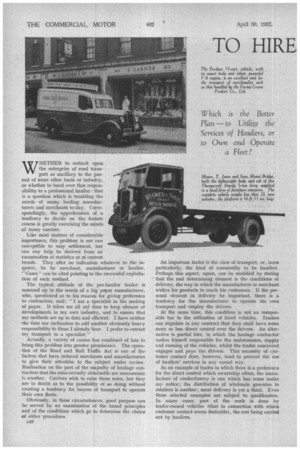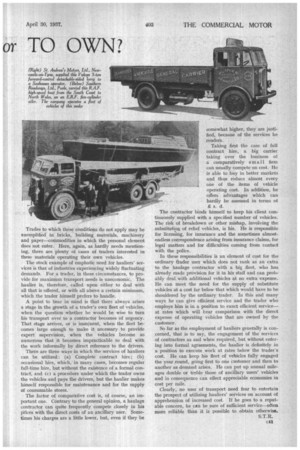TO HIRE
Page 98

Page 99

If you've noticed an error in this article please click here to report it so we can fix it.
or TO OWN? Which is the Better Plan— to Utilize the Services of Hauliers, or to Own and Operate
a Fleet?
WHETHER to embark upon the enterprise of road transport as ancillary to the pursuit of some other trade or industry, or whether to hand over that responsibility to a professional haulier that is a question which is troubling the minds of many leading manufacturers and merchants to-day. Correspondingly, the apprehension of a tendency to decide on the former course is greatly exercising the minds of many carriers.
Like most matters of considerable importance, this problem is not one susceptible to easy settlement, nor can any help be derived from an examination of statistics or of current trends. They offer no indication whatever to the inquirer, be he merchant, nianufaeturer or haulier. " Cases " can be cited pointing to the successful exploitation of each method.
The typical attitude of the pro-haulier trader is summed up in the words of a big per manufacturer, who, questioned as to his reasons for giving preference to contractors, said: "I am a specialist in the making of paper. It takes me all myc time to keep abreast of developments in my own industry, and to ensure that my methods are up to date and efficient. I have neither the time nor inclination to add another obviously heavy responsibility to those I already bear. I prefer to entrust my transport to a specialist."
Actually, a variety of causes has combined of late to bring this problem into greater prominence. The operation of the Road and Rail Traffic Act is one of the factors that have induced merchants and manufacturers to give their attention to the subject under review. Realization on the part of the majority of haulage contractors that the rates recently obtainable are uneconomic is another. Carriers wish to raise those rates, but they are in doubt as to the possibility of so doing without creating a tendency for buyers of transport to operate their own fleets.
Obviously, in these circumstances, good purpose can be served by an examination of the broad principles and of the conditions which go to determine the choice of either procedure.
c40 An important factor is the class of transport, or, more particularly, the kind of commodity to be handled. Perhaps this aspect, again, can be modified by stating that the real determining element is the conditions of delivery, the way in which the manufacturer or merchant wishes his products to reach his customers. if the personal element in delivery be important, there is a tendency for the manufacturer to operate his own transport and employ the drivers.
At the same time, this condition is not an insuperable bar to the utilization of hired vehicles. Traders can stipulate in any contract that they shall have some more or less direct control over the drivers. An alternative is partial hire, in which the haulage contractor makes himself responsible for the maintenance, supply and running of the vehicles, whilst the trader concerned engages and pays the drivers. This necessity of customer contact does, however, tend to prevent the use of hauliers' services in any casual way.
As an example of trades in which there is a preference for the direct control which ownership offers, the manufacture of confectionery is one which has come under my notice ; the distribution of wholesale groceries to retailers is another ; meat delivery is yet a third. Even these selected examples are subject to qualification. In many cases, part of the work is done by trader-owned vehicles (that in connection with which customer contact seems desirable), the rest being carried out by hauliers. Trades to which these conditions do not apply may be exemplified in bricks, building materials, machinery and paper—commodities in which the personal element does not enter. Here, again, as hardly needs mentioning, there are plenty of cases of traders interested in these materials operating their own vehicles.
The stock example of emphatic need for hauliers' services is that of industries experiencing widely fluctuating demands. For a trader, in these circumstances, to provide for maximum transport needs is uneconomic. The haulier is, therefore, called upon either to deal with all that is offered, or with all above a certain minimum, which the trader himself prefers to handle.
A point to bear in mind is that there always arises a stage in the growth of •a trader's own fleet of vehicles, when the question whether he would be wise to turn his transport over to a contractor becomes of urgency. That stage arrives, or is imminent, when the fleet becomes large enough to make it necessary to provide expert supervision, when the vehicles become so numerous that it becomes impracticable to deal with the work informally by direct reference to the drivers.
There are three ways in which the services of hauliers can be utilized: (a) Complete contract hire; (b) occasional hire, which, in many cases, becomes regular full-time hire, but without the existence of a formal contract, and (c) a procedure under which the trader owns the vehicles and pays the drivers, but the haulier makes himself responsible for maintenance and for the supply of consumable stores.
The factor of comparative cost is, of course, an important one. Contrary to the general opinion, a haulage contractor can quite frequently compete closely in his prices with the direct costs of an ancillary user. Sometimes his charges are a little lower, but, even if they be somewhat higher, they are justified, because of the services he renders. .
Taking first the case of full contract hire, a big carrier taking over the business of a comparatively s mall firm can usually compete on cost. He is able to buy in better markets and thus reduce almost every one of the items of vehicle operating cost. In addition, he offers advantages which can hardly be assessed in terms ot 2 s. d.
The contractor binds himself to keep his client continuously supplied with a specified number of vehicles. The risk of breakdown or other mishap, involving the substitution of relief vehicles, is his. He is responsible for licensing, for insurance and the sometimes almostendless correspondence arising from insurance claims, for legal matters and for difficulties coming from contact with the police.
In these responsibilities is an element of cost for the ordinary (leder user which does not rank as an extra to the haulage contractor with a big fleet, who has already made provision for it in his staff and can probably deal with additional vehicles at no extra expense. He can meet -the need for the supply of substitute vehicles at a cost far below that which would have to be shouldered by the ordinary trader. In this and many ways he can give efficient service and the trader who employs him is in a position to exact efficient service— at rates which will bear comparison with the direct expense of operating vehicles that are owned lay the customer.
So far as the employment of hauliers generally is concerned, that is to say, the engagement of the services of contractors as and when required, but without catering into formal agreements, the haulier is definitely in a position to execute work at rates below the trader's cost. He can keep his fleet of vehicles fully engaged the year round, going first to one customer and then to another as demand arises. He can put up annual mileages double or treble those of ancillary users' vehicles and in consequence can effect appreciable economies in cost per mile.
Clearly, no user of transport need fear to entertain the prospect of utilizing hauliers' services on account of apprehension of increased cost. If he goes to a reputable concern, he can be sure of sufficient service—often more reliable than it is possible to obtain otherwise. S.T.R. c41








































































































































































